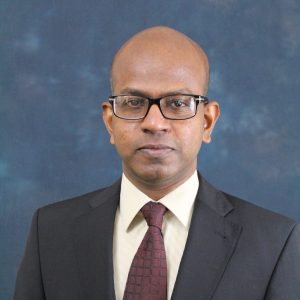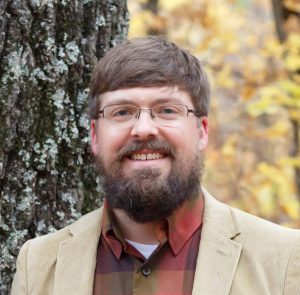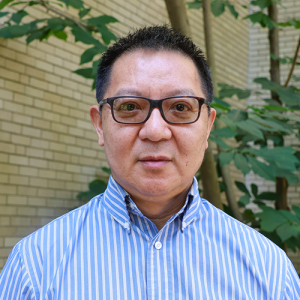Ecosystems & Environment

Dec. 15, 2017
Rebecca North
Research in the North group is focused on addressing the question: What controls algal biomass of inland waters? North’s team focuses on the effects of multiple stressors on nutrient cycling, bioavailability, and primary production in Missouri water bodies with particular attention to the source and timing of nutrient loading and the response of the receiving water body. Ecosystem stressors include, but are not limited to: climate change, landscape modification (i.e., agricultural, urban, and industrial applications), eutrophication, and invasive species (i.e., zebra mussels). North’s research is conceptually driven and applies field, lab, and quantitative approaches to studying issues in watershed and…

Nov. 14, 2017
Noel R. Aloysius
Noel Aloysius’ research and teaching focus on terrestrial hydrology, watershed biophysical processes and environmental informatics. Noel’s research group investigates how climate and weather, landscapes and land management drive precipitation-runoff processes and fate and transport of pollution at field-, watershed- and continental-scale river basins. His group utilizes field observations, long-term hydro-climate data, numerical and statistical models to examine the movement of water, solutes and sediments in response to environmental change and human management. Noel is a member of the Gulf Hypoxia Task Force SERA-46 research group representing the University of Missouri. The SERA-46 group is a consortium of twelve Land Grant…

Nov. 3, 2017
Chung-Ho Lin
Lin is the lead scientist for the bioremediation, natural products and bioanalytical programs at the Center for Agroforestry at University of Missouri. His primary research involves the use of plants, microbes and engineered enzymes for bioremediation, ecological restoration, and development of bioeconomy. His bioremediation research focuses on bioremediation of organic pollutants and human pathogens. Since the COVID19 pandemic in 2020, Dr. Lin has successfully redirected the analytical resources and led his research team joining the task force ‘Coronavirus Sewershed Surveillance Project’ sponsored by the state and federal agencies to provide an early warning and capture the emergence of the…

Nov. 3, 2017
Benjamin Knapp
Educational background Ph.D. Forest Resources, Clemson University, 2012 Courses taught Forest Fire Control and Use Practice of Silviculture Silviculture Field Practicum…

Nov. 3, 2017
Hong S. He
Educational background Ph.D., Chinese Academy of Sciences Courses taught NAT_R 2325/8325: Introduction to Geographic Information Systems NAT_R 4365/8365: GIS Applications NAT_R 8395: Landscape Ecology & GIS Analysis II…

Oct. 27, 2017
Alba Argerich
My research encompasses the following key areas: 1. Nutrient Dynamics and Biogeochemical Processes in Streams: Excess nutrient loading is a major cause of freshwater ecosystem impairment. My research delves into understanding the factors controlling nutrient transport and transformation in streams throughout the year. We have developed innovative techniques, such as a smart tracer using fluorescent dye, to study water exchange between the stream channel and the hyporheic zone, shedding light on how this exchange influences water quality and ecosystem function. 2. Stream metabolism: Stream metabolism involves the balance between organic matter production and consumption in stream ecosystems, impacting nutrient cycling and carbon…

Oct. 27, 2017
Stephen H. Anderson
Educational background Ph.D., North Carolina State University, 1985 Courses taught Environmental Science/Civil Engineering 3250: Pollutant Fate and Transport Environmental Science/Soil Science 4305/7305: Environmental Soil Physics Environmental Science/Soil Science 4306/7306: Environmental Soil Physics Laboratory Environmental Science/Natural Resources 4320/7320: Hydrologic and Water Quality Modeling Biological Engineering 4350/7350/Civil Engineering 4720/7720: Watershed Modeling Using GIS Biological Engineering 8250: Water Management Theory Environmental Science/Soil Science 8400: Transport in the Vadose Zone Plant Science 4355/7355: Advanced Turfgrass Management…

Oct. 27, 2017
Sybill K. Amelon
Amelon’s studies focus on ecology of bat species related to population demography, behavioral ecology, resource selection, habitat use, diet/nutritional analysis and energy dynamics. A range of techniques are used including temperature sensitive radio-telemetry to monitoring of bats outfitted with passive transponders (PIT tags) and population genetics to help understand social behavior, winter / summer movements, roosting habitat selection and different overwintering strategies. Her disease research focuses on understanding and mitigating physiological impacts caused by WNS in bats. Mortality rates in affected hibernacula generally exceed 75% and have been documented as high as 99-100%. Focus is on mitigation tools to increase…

July 7, 2017
Teng Teeh Lim
Teng Lim develops and assesses practical management and mitigations for agricultural waste management and environmental issues. Emphases include improvement of nutrient management and treatment; air quality including emission evaluation and modeling; and odor mitigation and odor setback distances. Collaborate to develop extension materials, interact with producers and agricultural businesses, and conduct internationally recognized research and extension programs. Educational background Ph.D., Agricultural and Biological Engineering, Purdue University…

July 3, 2017
Dan Downing
Educational background M.S. Extension and Adult Education, University of Missouri B.S. Agricultural Mechanization, University of Missouri Courses taught AST 2320: Internal Combustion Power…
- « Previous
- 1
- 2
- 3
- 4
- 5